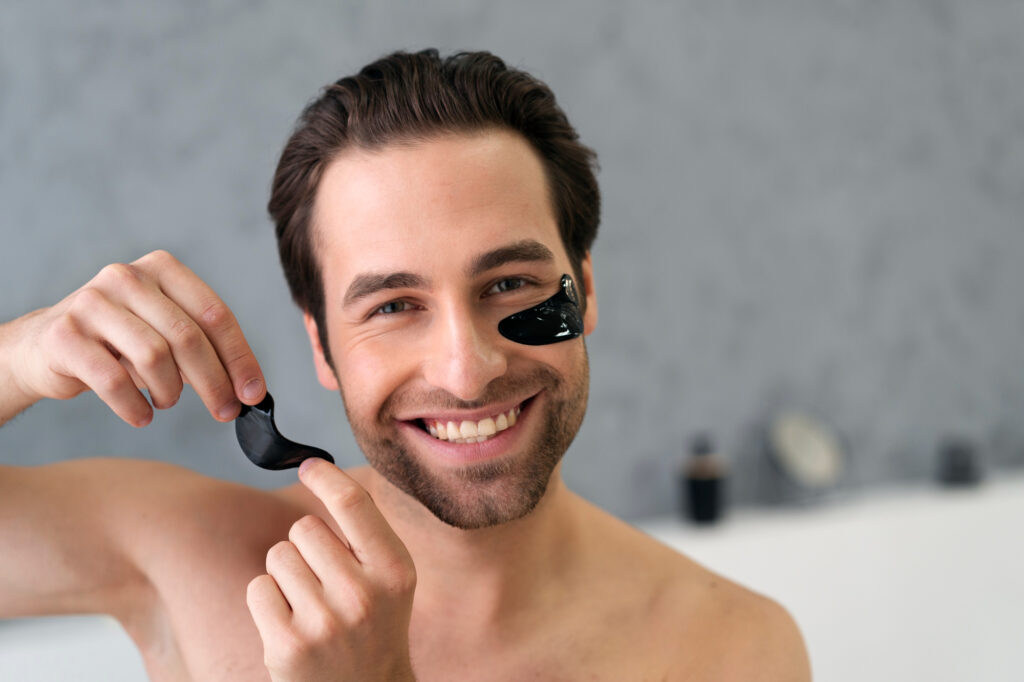
Let’s face it, guys, taking care of your skin isn’t just for women anymore. Healthy skin isn’t just about looking good; it’s about feeling confident and comfortable in your own skin. But with all the skincare products out there, it can be confusing to know where to start. This guide is here to break it down for you! We’ll explore common men’s skin concerns and effective strategies for men’s skincare, recommend effective solutions, and help you build a simple skincare routine that fits your needs.
Why Should Men Care About Skincare?
Men’s skin is different from women’s skin. It’s typically thicker, oilier, and more prone to razor bumps and ingrown hairs due to shaving. Taking care of your skin goes beyond looking good. It can help prevent:
- Dryness and irritation: Especially after shaving, your skin can feel dry and itchy. A proper skincare routine keeps your skin hydrated and healthy.
- Acne breakouts: While acne is often associated with teenagers, it can affect men well into adulthood. A good skincare routine can help prevent and manage breakouts.
- Signs of aging: Wrinkles, fine lines, and sun damage can happen to anyone. Developing healthy skincare habits early on helps prevent these signs of aging.

Understanding Your Skin Type: The First Step to a Great Routine
Before diving into products, it’s crucial to understand your skin type. Here are the three main types:
- Oily Skin: This skin type often feels greasy and prone to breakouts. You might notice larger pores and a shiny appearance.
- Dry Skin: Dry skin feels tight, flaky, and can be itchy. Sometimes, dry skin can be sensitive and easily irritated.
- Combination Skin: This is the most common skin type. You might have an oily T-zone (forehead, nose, and chin) with drier cheeks and jawline.
Also Read: Revitalize Your Skin Naturally: Discover 08 Best Homemade Toners for Dry Skin
Finding the Right Men’s Skincare Products:
Now that you know your skin type, let’s explore some essential products for your skincare routine:
- Cleanser: Washing your face twice a day, morning and night, is crucial for removing dirt, oil, and sweat. Choose a gentle cleanser that suits your skin type.
- Moisturizer: Moisturizer keeps your skin hydrated and prevents dryness. A good moisturizer can also help reduce the appearance of wrinkles. For oily skin, opt for a lightweight, oil-free moisturizer. For dry skin, choose a richer formula.
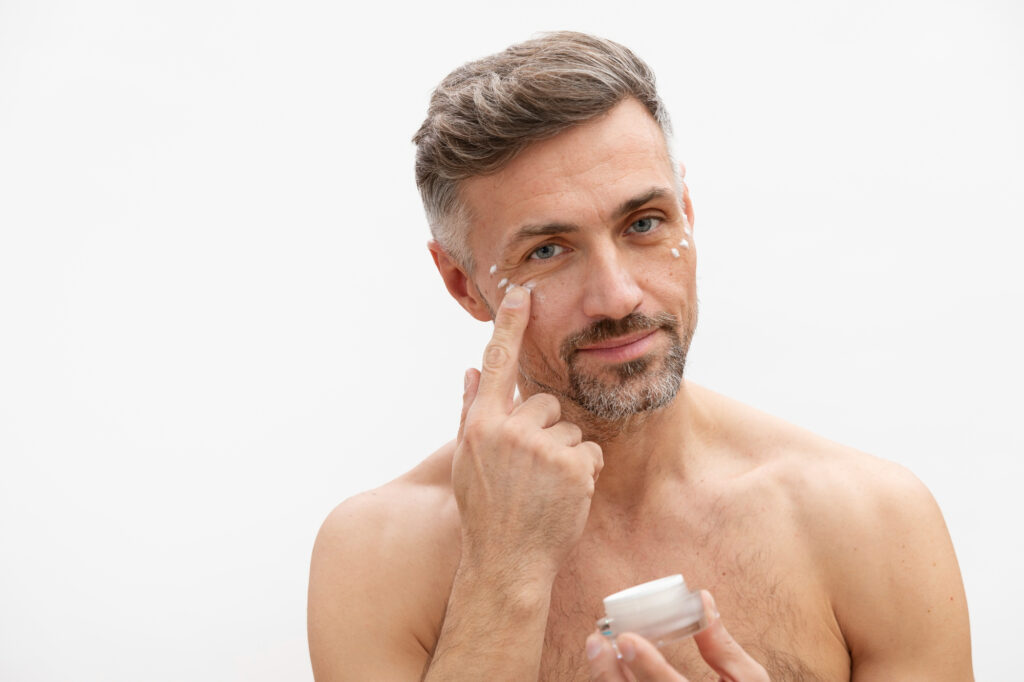
- Sunscreen: Sun damage is one of the leading causes of wrinkles and skin cancer. Apply sunscreen with SPF 30 or higher every day, even on cloudy days. Look for a broad-spectrum sunscreen that protects against UVA and UVB rays.
Addressing Specific Skin Concerns:
Beyond the basics, there are additional products that target specific skin concerns. Here are a few examples:
- Exfoliator: Exfoliating your skin a few times a week can help remove dead skin cells and prevent ingrown hairs. However, choose a gentle exfoliator, especially if you have sensitive skin.
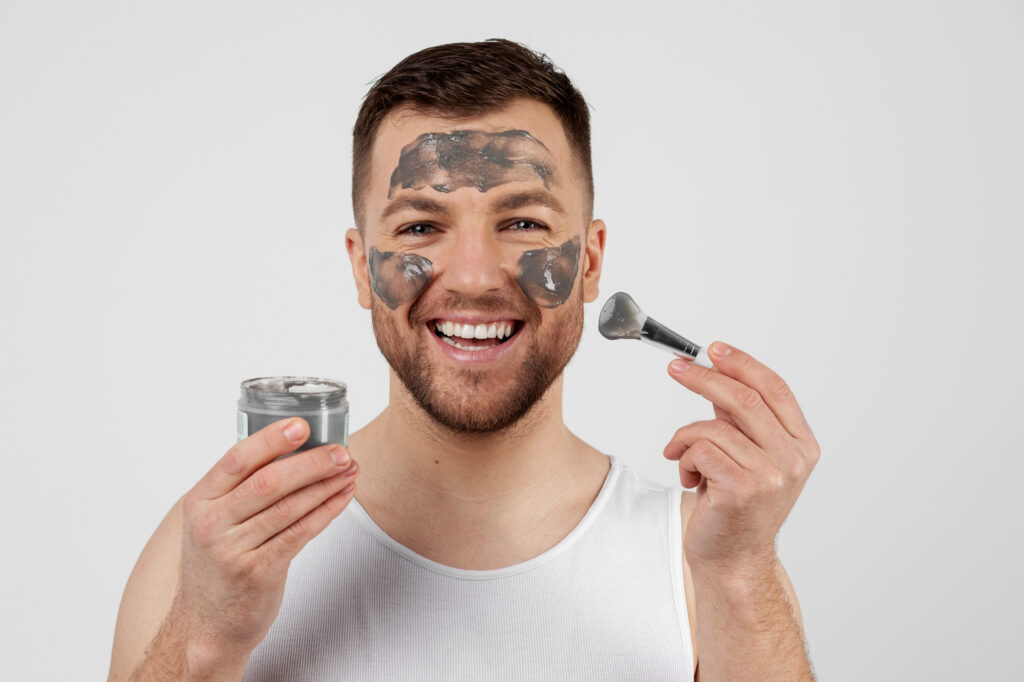
- Aftershave Soother: Shaving can irritate your skin. An aftershave balm or lotion can soothe irritation and razor bumps. Look for ingredients like aloe vera or witch hazel to calm inflamed skin.
- Eye Cream: The skin around your eyes is thinner and more delicate than the rest of your face. An eye cream can help hydrate this area and reduce the appearance of dark circles and puffiness.
Also Read: Unveiling the Future: 15 Best High-Tech Skincare Devices in 2024
Building a Simple Skincare Routine for Men:
Here’s a basic skincare routine you can follow every day:
- Morning: Wash your face with a gentle cleanser. Apply moisturizer with SPF.
- Evening: Wash your face with a gentle cleanser. Apply moisturizer (and eye cream, if desired).
Bonus Tip: Don’t forget about your lips! Exfoliate your lips occasionally and use a lip balm with SPF to keep them protected and hydrated.
Beyond Products: Lifestyle Habits for Healthy Skin
A healthy lifestyle can significantly improve the health and appearance of your skin. Here are some tips:
- Drink plenty of water: Staying hydrated keeps your skin plump and healthy.
- Eat a balanced diet: Eating plenty of fruits, vegetables, and whole grains provides your skin with essential nutrients.
- Get enough sleep: When you’re sleep-deprived, your skin can appear dull and tired. Aim for 7-8 hours of sleep each night.
- Manage stress: Stress can wreak havoc on your skin, leading to breakouts and inflammation. Find healthy ways to manage stress, such as exercise, meditation, or spending time in nature.
- Limit alcohol and smoking: Excessive alcohol consumption and smoking can dehydrate your skin and accelerate the signs of aging.
- Shave with care: Use a sharp razor and shaving cream or gel to prevent irritation and ingrown hairs. Shave in the direction of hair growth and avoid harsh aftershave lotions containing alcohol.
Remember, consistency is key! Sticking to your skincare routine for a few weeks is crucial to see results. Be patient, experiment with different products to find what works best for you, and enjoy the benefits of healthy, glowing skin!
Advanced Skincare Options for Men:
Once you’ve mastered the basics, you might be curious about additional tools and treatments. Here are some options:
- Facial Masks: Masks can be a great way to give your skin a boost of hydration or address specific concerns. Choose masks based on your skin type and desired results.
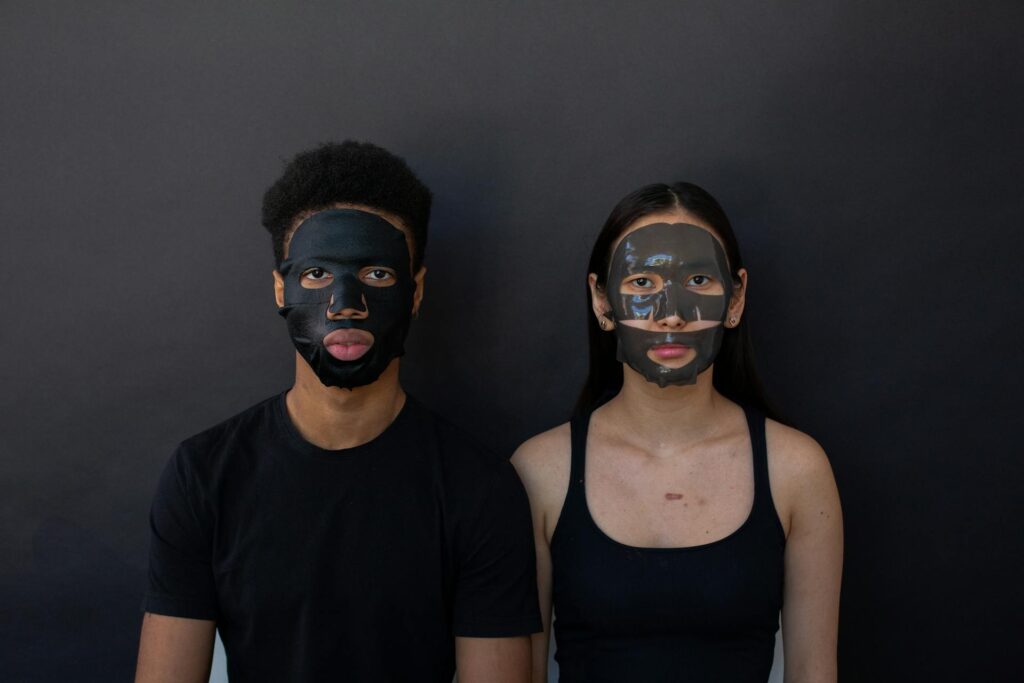
- Serums: These lightweight serums contain concentrated ingredients to target specific concerns like wrinkles, acne, or dark circles.
- Dermatologist Consultations: A dermatologist can assess your skin, recommend personalized skincare routines, and address any specific concerns you might have.
Common Men’s Skincare Myths Debunked:
There’s a lot of misinformation floating around about skincare. Let’s clear up some common myths:
- Myth: Men don’t need to moisturize oily skin. Fact: Moisturizing even oily skin helps regulate oil production and keeps your skin healthy. Choose a lightweight, oil-free moisturizer.
- Myth: Expensive skincare products are always better. Fact: There are many effective drugstore skincare products available. Focus on finding products with the right ingredients for your skin type.
- Myth: Shaving more often prevents razor bumps. Fact: Shaving too frequently can irritate your skin and lead to ingrown hairs. Stick to shaving every other day or as needed.
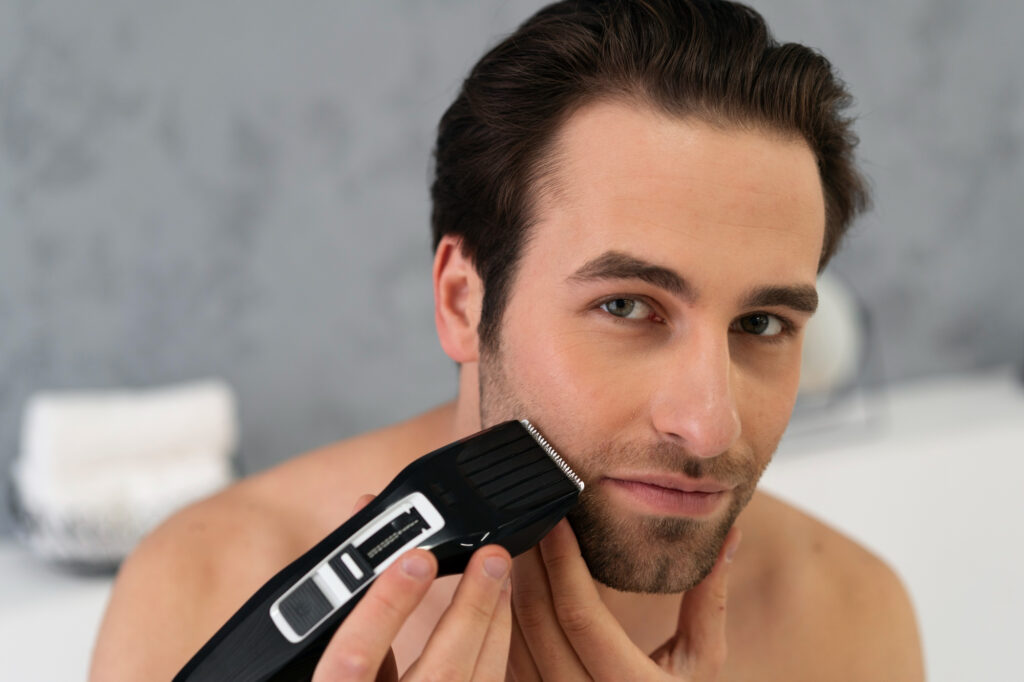
The Takeaway: Men’s Skincare Made Easy
Taking care of your skin doesn’t have to be complicated or expensive. By understanding your skin type, following a simple skincare routine, and making healthy lifestyle choices, you can achieve and maintain healthy, glowing skin. Remember, confidence starts with feeling good in your own skin, so embrace your skincare journey and enjoy the results!
Ready to Get Started? Resources for Men’s Skincare
Here are some resources to help you navigate the world of men’s skincare:
- American Academy of Dermatology: This website offers a wealth of information on skincare for men, including tips on choosing products and addressing specific concerns: https://www.aad.org/
- Men’s Health Magazine: This magazine website often features articles on men’s skincare, including product recommendations and grooming tips: https://www.menshealth.com/
- Popular Men’s Skincare Brands: Many popular skincare brands offer lines specifically formulated for men. Here are a few examples to get you started: Lab Series ([https://www.labseries.com/]), Jack Black ([https://www.getjackblack.com/]), and Kiehl’s Since 1851 ([https://www.kiehls.com/]).
By utilizing these resources and following the tips in this guide, you can develop a personalized skincare routine that keeps your skin healthy and looking its best! So, ditch the confusion, embrace the routine, and get ready to experience the confidence that comes with healthy, glowing skin!
Men’s Skincare for Different Skin Concerns: FAQs
This section dives deeper into addressing specific skin concerns men commonly face. Here are some frequently asked questions to guide you:
- I have oily skin that’s prone to breakouts. What products should I use?
For oily, acne-prone skin, choose a gentle cleanser that removes excess oil without stripping your skin. Look for cleansers labeled “oil-free” or “non-comedogenic,” which means they won’t clog your pores. An oil-free moisturizer can also be beneficial. Additionally, consider incorporating a toner or acne treatment containing salicylic acid or benzoyl peroxide to combat breakouts. However, if your acne is severe, consult a dermatologist for a personalized treatment plan.
- My skin feels dry and tight after shaving. What can I help?
Shaving can disrupt your skin’s natural moisture barrier. Here are some tips:
- Prep your skin: Before shaving, use warm water and a shaving cream or gel to soften your beard and create a barrier between your skin and the razor.
- Shave in the direction of hair growth: This helps prevent irritation and ingrown hairs.
- Moisturize: After shaving, apply a fragrance-free moisturizer to soothe your skin and replenish moisture. Look for ingredients like hyaluronic acid or aloe vera for extra hydration.
- Consider a post-shave balm: A soothing aftershave balm can calm irritation and razor bumps. Choose one with calming ingredients like aloe vera or witch hazel, and avoid harsh alcohol-based products.
- I’m starting to notice wrinkles and fine lines. What skincare products can help?
As we age, our skin loses collagen and elasticity, leading to wrinkles and fine lines. Here are some products to consider:
- Moisturizer with SPF: A daily moisturizer with SPF 30 or higher is essential to protect your skin from sun damage, a major contributor to wrinkles.
- Retinol: This powerful ingredient stimulates collagen production and helps reduce the appearance of wrinkles and fine lines. However, retinol can be irritating, so start with a low concentration and apply it at night to avoid sun sensitivity.
- Eye Cream: The skin around your eyes is thinner and more prone to wrinkles. An eye cream with retinol or peptides can help target this delicate area.
- I get dark circles and puffiness under my eyes. How can I address this?
There are several factors that can contribute to dark circles and puffiness under the eyes, including lack of sleep, allergies, and dehydration. Here are some tips:
- Get enough sleep: Aim for 7-8 hours of sleep each night to allow your body to rest and regenerate.
- Stay hydrated: Drinking plenty of water helps keep your skin plump and reduce puffiness.
- Eye Cream: Choose an eye cream with ingredients like caffeine or hyaluronic acid to help reduce puffiness and brighten the under-eye area.
- Reduce eye strain: Limit screen time and take breaks from looking at computers and phones to reduce eye fatigue, which can contribute to dark circles.
- I have sensitive skin that’s easily irritated. What skincare tips should I follow?
Sensitive skin requires a gentle touch. Here are some tips:
- Choose fragrance-free products: Fragrances can irritate sensitive skin. Look for products labeled “fragrance-free” or “hypoallergenic.”
- Patch test before applying: Before applying any new product to your entire face, test it on a small area of your inner arm first. Wait 24 hours to see if there’s any reaction.
- Skip harsh scrubs and exfoliants: These can irritate sensitive skin. Opt for a gentle chemical exfoliant with ingredients like AHAs (alpha hydroxy acids) or BHAs (beta hydroxy acids) a few times a week.
- Moisturize regularly: A good moisturizer helps create a barrier to protect your skin from irritants. Look for a fragrance-free moisturizer formulated for sensitive skin.
- Is there anything I can do to prevent ingrown hairs?
Ingrown hairs are a common problem for men who shave. Here are some tips to prevent them:
- Exfoliate regularly: Exfoliating a few times a week helps remove dead skin cells that can trap hair and lead to ingrown hairs. Use a gentle exfoliator suitable for your skin type.
- Shave with a sharp razor: A dull razor can tug and pull at hair, increasing the risk of ingrown hairs. Replace your razor blade regularly, ideally every 5-7 shaves.
- Shave in the direction of hair growth: This reduces the chances of the razor cutting the hair too short, which can make it curl inwards and become ingrown.
- Don’t apply too much pressure: Shaving with too much pressure can irritate the skin and increase the risk of ingrown hairs. Let the razor glide smoothly over your skin.
- Apply a soothing aftershave balm: Look for a product with calming ingredients like aloe vera or witch hazel to soothe irritation and prevent ingrown hairs.
- Should I use a toner in my skincare routine?
Toners can be helpful, but they aren’t essential for everyone. Here’s what to consider:
- Oily Skin: A toner can help remove excess oil and tighten pores. Choose an alcohol-free toner to avoid drying out your skin.
- Dry Skin: Toners can be too drying for dry skin. Opt for a hydrating toner with ingredients like hyaluronic acid or rosewater.
- Sensitive Skin: Skip toners altogether if you have sensitive skin. They can irritate your skin.
- Is it okay to use my girlfriend’s/wife’s skincare products?
It’s generally not recommended to share skincare products with someone else. Women’s skincare products are often formulated for different skin concerns and might be too harsh for men’s thicker skin. It’s best to stick to products specifically designed for men’s skin.
- How often should I change my skincare routine?
There’s no need to constantly change your skincare routine if it’s working well for you. However, as your skin changes (due to age, environment, etc.), you might need to adjust your products or routine. Pay attention to how your skin reacts and make changes as needed.
- I’m still confused about what products to use. Should I see a dermatologist?
Absolutely! A dermatologist is a skin care specialist who can assess your skin type, address any specific concerns you have, and recommend a personalized skincare routine. They can also provide guidance on prescription medications that might be beneficial for certain skin conditions.

